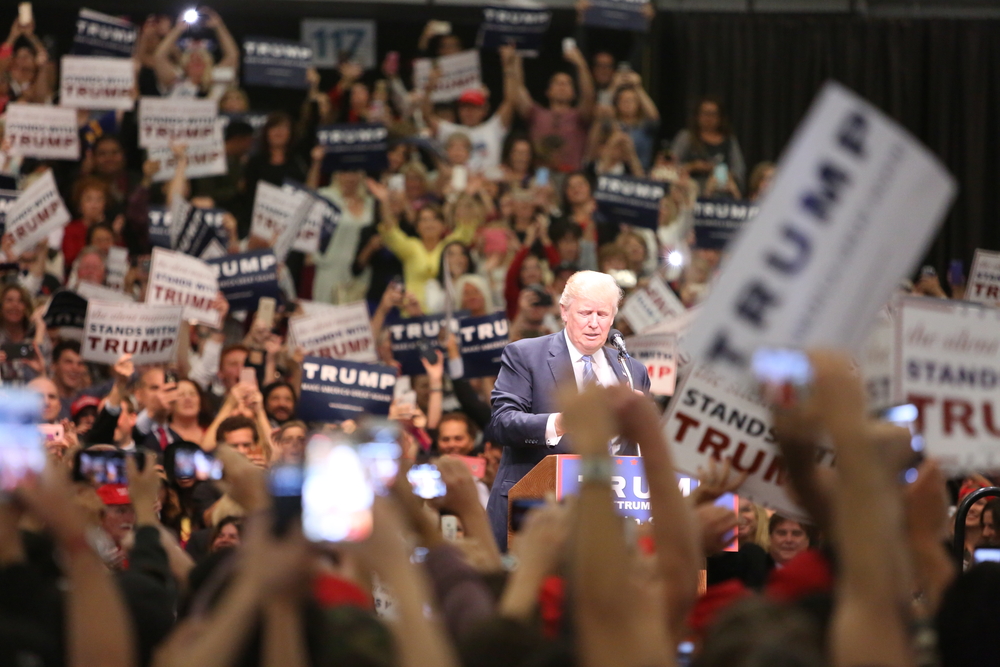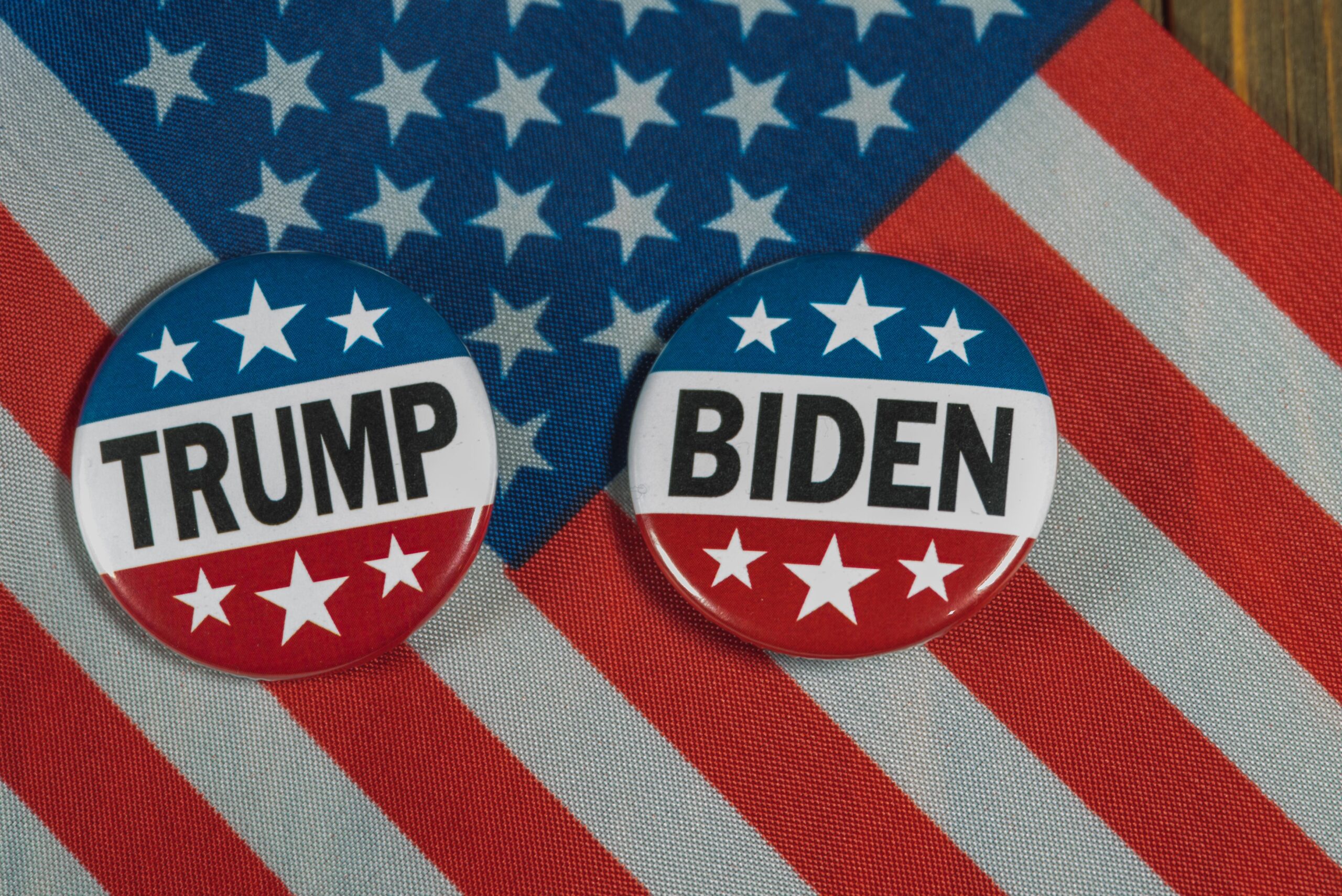
An edited version of this article first appeared in the Sunday Express.
This week Donald Trump is expected to sweep the board in 17 more Republican primaries, adding to his victories so far in places including New Hampshire, Michigan, and his remaining opponent’s home state of South Carolina.
Some see Trump’s easy stroll through the primaries – he has not even attended a debate – as proof that his support has become a cult of personality. In eight years of studying the Trump phenomenon through my large-scale polling, and especially focus groups with all kinds of voters throughout the US, I have certainly found that a large slice of the American electorate is so in thrall to the persona of Donald J. Trump that it has come to dominate not only the way they vote but their whole political outlook. But I’m not talking about the people who are choosing him as their party’s presidential nominee. I’m talking about his more fanatical opponents. Though he certainly has his devoted enthusiasts, Trump’s critics are much more mesmerised by his daily sayings and doings than his backers. For most of his voters, Trump is simply the means to an end.
One way to help understand Trump’s enduring appeal is to look at the reasons they are rejecting Nikki Haley, who combines executive experience as the successful governor of a conservative state with diplomatic know-how honed as Trump’s UN ambassador. As a less polarising figure she also offers the chance to move on from the Trump circus with a new generation of leaders, which many long to do. What’s not to like?
Everything the Republican party used to be, she’s that.
The answer, according to the Republicans we spoke to during the early primaries, is that they associate her with the old GOP establishment, corporate America, the donor class, and an internationalist rather than “America First” outlook. Her stance on things like debt reduction, entitlement reform and support for Ukraine appeal to traditional Republicans who supported John McCain and Mitt Romney, and the kind of conservatives who despair of Trump and the direction in which he has taken the party. “She’s a globalist neocon warmonger,” as one primary voter put it to us in North Carolina. “Everything the Republican party used to be, she’s that.”
Trump, by contrast, has managed in their eyes to keep the mantle of “a businessman, not a politician.” To them he remains an outsider not beholden to the political class or the rules of its games; a leader who will take their side against Washington – not to mention a corporate, media and academic elite that seems to ignore or despise them. More importantly, he reflects their view of the world. They believe he will act on the issues they care about and that he has the record in office to justify their faith. They associate his presidency with a stronger economy, deregulation, domestic energy security, action on immigration, efforts to bring back jobs to the USA and rebalance the terms of trade with China, the appointment of conservative judges to the Supreme Court and a robust international stance.
Who, incidentally, are “they”? According to the media characterisation, a typical Trump supporter is essentially an old, white, non-college-educated redneck. But like all successful political movements, his coalition is much broader and more diverse than that. Travelling around America, it is always interesting to meet and listen to Trump voters who are not straight out of the liberal conception of MAGA central casting. We regularly meet Hispanics whose families entered the US through legal means and believe others should do the same; small business owners who were doing much better before the Biden presidency; professionals worried about the growth of regulation and the direction of the country; and even African Americans who recognise Trump’s anti-establishment credentials, recall his halting attempts to address the incarceration rates in their community and have little time for what they see as the soft-on-crime approach of the contemporary left.
I would much rather put up with Trump’s behaviour than put up with what we have.
These voters are not blind to his faults. They often deplore his conduct. Yet even for most Republicans who would have preferred another nominee, these things are a sideshow: it’s the issues that matter. They see mayhem on the border, rising crime, an environmental agenda they believe adds to their spiralling living costs, a drift into identity politics that they find deeply worrying, weak American leadership in an increasingly dangerous world and a willingness to be drawn into overseas conflicts they want no part of – and they consider these things more important than the niceties of presidential etiquette. “I would much rather put up with Trump’s behaviour than put up with what we have,” said one Republican-leaning Texan who was by no means enamoured of the former president.
Moreover, though they may dislike his temperament, they believe it has its uses. They would cheerfully nominate someone they believed could “do Trump without being Trump”, as they sometimes put it, but no such candidate has yet emerged. The sheer force of his personality – the view that “he can’t be bossed”, as another said – is an important part of the reason they trust him to deliver. The way he goes about things is a tool for getting the job done. “I wouldn’t want to be his friend, I don’t enjoy a lot of the things about him, but I like a lot of the things he stands for and he gets these things done,” a likely primary voter from Michigan told us. “He has this demanding personality and he can convince people, and that’s really, really important.”
He can’t be bossed.
This is also the context in which they see, for example, the claim that he told the leader of an unnamed country that he would encourage Russia to attack NATO allies skimping on their defence budgets. While opponents and the media were scandalised, his voters would recognise a classic instance of Trump’s version of diplomacy – he was simply reminding them of his tough negotiating approach and delivering the (domestically popular) message that Europe cannot expect Americans to pick up the tab for its security indefinitely. As Silicon Valley entrepreneur Peter Thiel first noted eight years ago, while his opponents and the media tend to take Trump literally but not seriously, his supporters do the opposite.
Trump’s opponents have wondered at the tenacity of his support since he first appeared on the political scene. At each new outrage the thought would recur: surely now they will come to their senses and see the man for what he is? For many, the multiple legal indictments brought with them the ultimate “surely now” moment: would they really vote for a convicted criminal – even if he were behind bars?
They’ve all got a Stormy.
The prospect does give some Republicans pause. But in a poll last year more than half of likely primary voters told us Trump should continue his campaign even if he is sent to jail. For opponents, this shows their unreasoning fanaticism, but again, there is more to it than that. To them, the legal action is a blatant attempt to prevent Trump’s re-election. If there is some substance to some of the charges, they say, they would not have been brought against any other public figure. Nor do they see many of them as disqualifying in themselves: “They’ve all got a Stormy,” said one voter of the allegation, which Trump denies, that he paid hush money to an actress after an affair.
More to the point, Trump supporters do not see the charges against him in isolation, but as one of a series of attempts to legitimise him that began eight years ago with “Russiagate” – the ultimately discredited theory that Kremlin interference helped tip the 2016 election in Trump’s favour, heavily promoted by Democrats and the media and the subject of a lengthy official investigation. They also point to the story of Hunter Biden’s incriminating laptop – heavily denied at the time and subject to a social media blackout, but which turned out in important respects to be true. They have since seen cable TV channel MSNBC refusing to cover Trump speeches, and legal attempts in two states simply to remove his name from the ballot (actions which they see as a more direct threat to democracy than anything Trump is accused of). Given what they see as this history of political, media and institutional opposition – a “witch hunt” as they often describe it – they are not inclined to see the 91 charges against him simply as a matter of the law taking its impartial course. For many, the same applies to the result of the 2020 election – though they wish he would stop talking about it and focus on the next one.
Even many of his backers acknowledge that if he is to succeed in that election, Trump needs the discipline to rein in the more unattractive parts of his character. They see that he doesn’t make it easy for uncommitted voters to line up behind him. And while he motivates the Republican base like no-one else, my polling shows he does the same for the Democrats. That is why Biden will do everything he can to make the election about Trump, and Trump will have to make it about the issues, and the voters.
Many, including a number of conservatives around the world, might wish that those voters would choose someone, anyone, else. Fair enough – but they should acknowledge that those choosing Trump are doing it on purpose, and with their eyes wide open. And much as his opponents might decry this transactional approach, they might reflect that their own vote is probably a transaction too: many will be voting for an octogenarian they think barely capable of holding office as a means to the end of keeping their enemy out of the White House.


